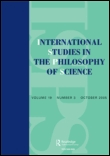
International Studies in the Philosophy of Science
Scope & Guideline
Cultivating critical perspectives on scientific methods and ethics.
Introduction
Aims and Scopes
- Philosophical Foundations of Science:
The journal consistently emphasizes the philosophical underpinnings of scientific theories and practices, exploring concepts such as realism, anti-realism, and the nature of scientific laws. - Interdisciplinary Approaches:
Papers often adopt interdisciplinary perspectives, integrating insights from philosophy, sociology, and cognitive science to examine scientific phenomena and practices. - Critical Examination of Scientific Methodology:
A significant focus is placed on the methodologies employed in scientific research, including discussions on hypothesis testing, experimental design, and the implications of different methodological approaches. - Ethics and Social Implications of Science:
The journal addresses ethical considerations and societal impacts of scientific research, including discussions on issues like harmful research practices, representation, and the social dimensions of scientific knowledge. - Historical Perspectives on Science:
Historical analyses of scientific theories and practices are also prevalent, allowing for a deeper understanding of how scientific concepts have evolved over time.
Trending and Emerging
- Philosophy of Quantum Mechanics:
Recent publications indicate a rising interest in the philosophical implications of quantum mechanics, particularly regarding realism, measurement, and the interpretation of quantum phenomena. - Ethics of Scientific Research:
There is a growing emphasis on ethical considerations in scientific research, with topics addressing harmful practices, representation issues, and the socio-political dimensions of scientific inquiry becoming increasingly central. - Artificial Intelligence and Science:
Emerging discussions surrounding the role of artificial intelligence in scientific research highlight a trend towards understanding how AI technologies influence scientific methodologies, practices, and epistemology. - Agnotology and Knowledge Production:
The exploration of agnotology—the study of ignorance and how it is produced—has gained traction, reflecting a critical examination of knowledge production processes and the societal implications of scientific claims. - Interdisciplinary Research Methodologies:
There is a notable trend towards the adoption of interdisciplinary methodologies that combine insights from philosophy, cognitive science, and social theory to enrich the understanding of scientific practices.
Declining or Waning
- Traditional Realism Debates:
While discussions around scientific realism continue, the intensity and frequency of traditional debates surrounding realism versus anti-realism appear to be decreasing, possibly overshadowed by newer methodologies and approaches. - Philosophy of Specific Scientific Disciplines:
There seems to be a decline in papers specifically focused on the philosophy of individual scientific disciplines, such as biology or physics, as the journal increasingly embraces more generalized philosophical inquiries and interdisciplinary approaches. - Foundational Issues in Logic and Induction:
Explorations of classical foundational issues in logic and induction, while still present, have become less frequent, with a noticeable shift towards practical applications and the implications of these foundational issues in contemporary science.
Similar Journals

Historical Studies in the Natural Sciences
Bridging Historical Insights with Scientific InquiryHistorical Studies in the Natural Sciences is a prestigious journal published by University of California Press, dedicated to advancing the understanding and appreciation of the interconnections between natural sciences, history, and philosophy. With an ISSN of 1939-1811 and an E-ISSN of 1939-182X, this journal has established itself as a vital resource for researchers, professionals, and students interested in the historical context and philosophical implications of scientific developments. As of 2023, it holds an impressive Q3 ranking in the category of History and Philosophy of Science and ranks 76th in the Arts and Humanities domain according to Scopus, representing the 65th percentile among peers. The journal spans a convergence of studies from 2008 to 2024, offering insights that bridge gaps between historical perspectives and scientific inquiry. Open access options enhance its accessibility, fostering a broader dialogue within the academic community and beyond. This journal stands as an important platform for scholars aiming to explore the rich tapestry of natural sciences through a historical lens, contributing significantly to the ongoing discourse in the field.
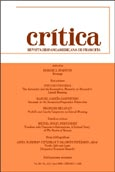
CRITICA-REVISTA HISPANOAMERICANA DE FILOSOFIA
Unveiling the Rich Tapestry of PhilosophyCRITICA-REVISTA HISPANOAMERICANA DE FILOSOFIA, published by CRITICA in Mexico, is a prominent peer-reviewed journal established in 1977 that has continually contributed to the field of philosophy in the Hispanic world. With an ISSN of 0011-1503 and an E-ISSN of 1870-4905, this journal plays a significant role in disseminating philosophical discourse, engaging both established and emerging scholars. It holds a Q3 ranking in the field of Philosophy according to the 2023 Category Quartiles and is ranked 305 out of 806 in the Scopus Arts and Humanities: Philosophy category, placing it in the 62nd percentile. Although it does not offer an open access option, its commitment to quality and relevance makes it an essential resource for researchers and students eager to explore contemporary philosophical issues and debates. The journal remains a vital platform for intellectual exchange, encouraging diverse perspectives that enrich the landscape of philosophical inquiry.
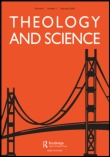
Theology and Science
Navigating the Terrain Where Theology Meets Empirical ResearchTheology and Science is a leading journal that explores the intricate relationships between theological discourse and scientific inquiry, contributing to the growing dialogue in the fields of Religious Studies, History, and Philosophy of Science. Published by the reputable ROUTLEDGE JOURNALS, TAYLOR & FRANCIS LTD in the United Kingdom, this journal provides a platform for high-quality research, fostering multidisciplinary approaches and addressing the philosophical implications of scientific developments from a theological perspective. With an impressive 2023 impact factor placing it in the Q1 category for Religious Studies and Q2 for both History and Philosophy of Science and Multidisciplinary studies, Theology and Science is positioned to influence academic discourse and shape contemporary understanding. Researchers, professionals, and students alike will find valuable insights and thought-provoking articles that not only advance scholarship but also bridge gaps between these two vital fields of human understanding.
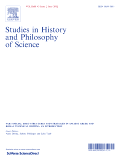
STUDIES IN HISTORY AND PHILOSOPHY OF SCIENCE
Exploring the Intersections of History and Philosophy in ScienceSTUDIES IN HISTORY AND PHILOSOPHY OF SCIENCE, published by Elsevier Science Ltd, is a leading academic journal dedicated to the exploration of historical and philosophical dimensions of science. With both an ISSN of 0039-3681 and E-ISSN of 1879-2510, this esteemed journal has established itself as a pivotal resource since its inception in 1970 and continues to publish cutting-edge research reflecting the evolution of scientific thought. Situated in the United Kingdom, it is recognized for its high-impact contributions, boasting a Q1 ranking in both History and History and Philosophy of Science categories as of 2023. Researchers in the humanities will benefit from the journal’s rigorous analysis and insightful discussions, as evidenced by its competitive Scopus rankings—placing it in the 96th and 83rd percentiles in their respective fields. Although not an open-access journal, it maintains a commitment to scholarly excellence, aiming to foster a deeper understanding of the interconnections between historical context and philosophical inquiry in the scientific domain, making it an invaluable resource for students, professionals, and researchers alike.
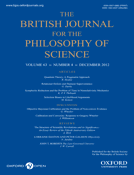
BRITISH JOURNAL FOR THE PHILOSOPHY OF SCIENCE
Shaping the Future of Scientific PhilosophyThe British Journal for the Philosophy of Science, published by University of Chicago Press, stands as a leading journal in the fields of philosophy and history of science. With its ISSN 0007-0882 and E-ISSN 1464-3537, this esteemed publication has been pivotal in advancing philosophical discussions surrounding scientific practice since its inception in 1950. Covering a diverse range of topics and critical analyses, it holds an impressive track record within the academic community, consistently achieving Q1 rankings across several categories, including History, Philosophy, and History and Philosophy of Science. With a Scopus rank placing it in the top percentiles of its respective fields, the journal is recognized not only for its academic rigor but also for its role in shaping contemporary philosophical discourse. While it is not an open-access journal, the British Journal for the Philosophy of Science provides essential insights and fosters critical thinking, making it an indispensable resource for researchers, professionals, and students dedicated to the nuanced interplay between science and philosophy.

Prometeica-Revista de Filosofia y Ciencias
Bridging Philosophy and Science for a Deeper UnderstandingPrometeica-Revista de Filosofia y Ciencias, published by LUCAS EMMANUEL MISSERI in Argentina, serves as a pivotal platform in the realms of philosophy and the history of science since its establishment in 2010 as an Open Access journal. With an ISSN and E-ISSN of 1852-9488, this journal not only emphasizes accessibility but also engages a diverse audience encompassing researchers, professionals, and students eager to explore the intersections of philosophical inquiry and scientific understanding. As of 2023, Prometeica boasts a commendable Q2 ranking in Philosophy and a Q3 ranking in the History and Philosophy of Science, reflecting its growing influence in academic discourse. Despite its rising status, with Scopus rankings indicating a niche yet dedicated readership, the journal remains committed to fostering innovative dialogue and critical thought in the philosophical community. This strategically positioned journal invites contributions that not only advance theoretical perspectives but also address contemporary issues within the philosophical and scientific domains, ensuring relevance and impact for its readers.

Epistemology & Philosophy of Science-Epistemologiya i Filosofiya Nauki
Exploring the Intersections of Philosophy and ScienceEpistemology & Philosophy of Science-Epistemologiya i Filosofiya Nauki is a prestigious journal published by the Russian Academy of Sciences - Institute of Philosophy, dedicated to advancing the discourse in the fields of epistemology, philosophy of science, and related disciplines. With a distinguished presence in academia, this journal is recognized for its exceptional contributions, evident through its categorization as a Q2 journal in Arts and Humanities and Philosophy, and a Q1 journal in Cultural Studies. Covering an expansive scope from 2017 to 2023, it facilitates a vital dialogue among scholars and professionals aiming to explore the intersections of knowledge, culture, and education. Although currently not open access, the rigorous peer-review process ensures that only high-quality research is published, enriching the intellectual landscape. The journal's commendable rankings in Scopus, particularly in Arts and Humanities and History and Philosophy of Science, reflect its commitment to scholarly excellence. For researchers, educators, and students, Epistemology & Philosophy of Science serves as an essential resource for understanding and contributing to the ongoing philosophical dialogues that shape our comprehension of scientific inquiry.

Spontaneous Generations-Journal for the History and Philosophy of Science
Illuminating the Past to Understand the Future of ScienceSpontaneous Generations: Journal for the History and Philosophy of Science is a dedicated publication focusing on the rich fields of history and philosophy within the scientific domain. Published by the Institute for the History and Philosophy of Science and Technology, this journal provides a vital platform for scholars, researchers, and students to explore and disseminate ideas that bridge the historical context and philosophical inquiries of scientific practices. With its commitment to open access, Spontaneous Generations ensures that groundbreaking research is widely available, fostering an environment of collaboration and knowledge sharing. Aiming to engage a diverse audience, this journal is pivotal for those looking to understand the evolution of scientific thought and its implications on contemporary issues, making it an essential resource in the academic community.

European Journal for Philosophy of Science
Pioneering Critical Discussions in the Philosophy of ScienceThe European Journal for Philosophy of Science, published by SPRINGER, stands as a prestigious platform for scholars in the realms of philosophy and history of science. With an impressive impact factor and categorized in the Q1 Quartile for both History and Philosophy of Science and Philosophy, this journal ranks among the top 10% of its peers, reinforcing its critical role in advancing academic discussions and insights within these fields. With its composition of rigorous peer-reviewed articles and a commitment to fostering interdisciplinary dialogue, the journal navigates foundational and contemporary issues that shape scientific inquiry. Although currently not Open Access, it provides invaluable access to researchers, professionals, and students who seek to deepen their understanding of the philosophical underpinnings of scientific practice. Housed in the Netherlands, the journal continuously engages with the evolving landscape of philosophy in the scientific domain, making it a key resource for anyone invested in the intersection of science and philosophy.
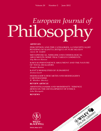
EUROPEAN JOURNAL OF PHILOSOPHY
Exploring the depths of thought across Europe and beyond.European Journal of Philosophy, published by Wiley, stands as a premier academic journal in the field of philosophy, recognized for its rigorous scholarship and impactful contributions. With an impressive Q1 ranking in Philosophy as noted in the 2023 category quartiles, the journal places within the top echelons of its field, reflecting its commitment to advancing philosophical discourse. Covering a broad spectrum of philosophical topics, the European Journal of Philosophy features peer-reviewed articles that engage both contemporary discussions and foundational theories, making it an invaluable resource for researchers, professionals, and students alike. The journal's accessibility to readers in the United Kingdom and beyond ensures a wide dissemination of knowledge, fostering an international dialogue that enriches philosophical inquiry. With a convergence of intellectual contributions since 1993, the journal continues to push the boundaries of philosophical thought into 2024 and beyond.